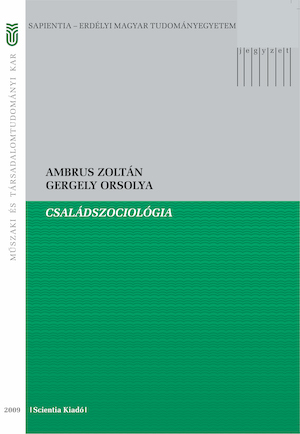Családszociológia
Sociology of the Family
Author(s): Zoltán Ambrus, Orsolya Gergely
Subject(s): Family and social welfare
Published by: Scientia Kiadó
Keywords: traditional family; sociological theories; divorce; non-marital alternatives;
Summary/Abstract: The book is structured in 14 chapters with concerns on the concepts and basic phenomena of the family sociology, presenting in a practical integrative vision the issue of family in its evolution and in the perspectives of changes that are taking place in the contemporary world. The definition of family, the interpretation of the concept is a complex assignment in the process of family study as informal group and as fundamental social institution. The analysis of the familial states and household types leads the reader to a more complex comprehension of the reality of family life. The presentation of sociological theories: interaction-based, structural-functional, evolutional and Marxist approaches offers a scientific frame for the study of the family. In continuation, we analyse the functions of the family and the possible causes of change in these functions. We have considered it adequate to introduce a chapter regarding the analysis of the evolution of the family, taking in consideration the sociohistorical aspects of the familial relationships. The traditional family, the life and characteristics of the traditional family represents an important theme of the book. The dimension of the family, the factors that influence this characteristic and the effects of a family’s size is presented from a functional point of view. The issue of the modern nuclear family is analysed by us in the context of sexual role changes and the dynamic of familial roles integrating important sociological aspect as the evolution of the relation between parent and child and as life cycles of the family. In a separate chapter, we take up the evolution of familial types in the contemporary world, taking in special consideration the evolution of the trends in the European Union. Analysing the 21st century’s family, we try to find out if family is in regress or it is a matter of a new familial legitimacy. We deal with the concept of marriage and divorce in the context of evolution in relationships, selecting consort, presenting different theories about divorce and non-marital alternatives. The sociological aspect of post-adolescence and the parental help offered to adult, youngsters represent a new challenge of the contemporary world. An important theme of the book constitutes the socialization of the family and violence in the family, presenting the characteristics of the primary socialization process in the contemporary family, interdependences and violent tendencies manifested in family. In an integrative concept, we are concerned with the family and the structure of the household, taking in consideration old and new studies as well, regarding this issue. Family planning and politics of the family in the contemporary world represents a distinct theme in our sociological analysis. We try to focus on the practical aspects of the family planning as pregnancy risks, unplanned pregnancy, the use of contraceptives and its efficacy, information and education aiming family planning. The practical aspects of sociological research of the family, the methodology of the research is analysed in close relation with the nature and type of the family issues, with the manners in dealing with this problems, as assistance and family therapy. The closure of the book focuses on the presentation of the socio-juridical aspects of the family, analysing the base forms of juridical protection of the family, legal regulation of matrimony, affinity and descent. At the end of each chapter, we offer the reader a short synthesis on the presented issues, a set of fundamental notions of familial sociology, as well as questions, issues and tasks for interpretation, terminology texts in Hungarian, Romanian and English. This totality with practical applicative value of the concerned themes aims a better understanding and utilization of the issues in familial sociology and assures an adequate motivational support to study the analysed phenomenon. The book is addressed, first of all to students, but we hope that it can constitute a useful informational source for everyone who is interested in the complex issues of family, in a better understanding and efficient handling of the matters and challenges that are raised by the family in the contemporary world.
Series: Jegyzetek
- Print-ISBN-13: 978-973-1970-18-9
- Page Count: 248
- Publication Year: 2009
- Language: Hungarian
- eBook-PDF
- Table of Content
- Introduction
- Sample-PDF

